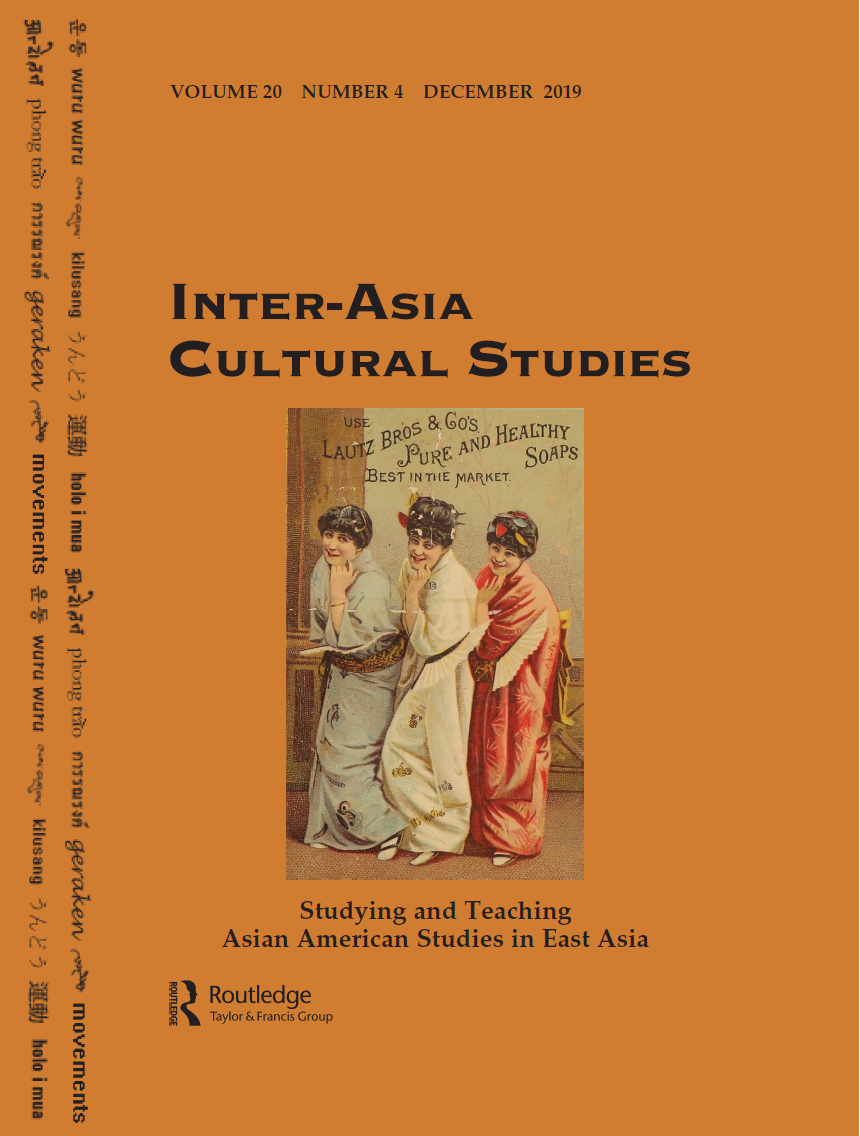

Inter-Asia Cultural Studies: Movements
2020-01-10

Inter-Asia Cultural Studies: Movements Volume 20 Number 4 December
Special issue: Reading and Teaching Asian American Studies in East Asia
Guest editor: Pin-chia Feng
Editorial introduction
Pin-chia Feng
Essays
Reimagining Asian American literary studies in China
Yingjian GUO and Yuanyuan FENG
Mapping transnationality and flexible citizenship in Ha Jin’s The Boat Rocker
Chung-jen CHEN
Gesturing beyond the frames: post-apocalyptic sentiments in Viet Thanh Nguyen’s The Sympathizer
Yu-yen LIU
Theorizing difference and difficulty: ‘wreading’ Asian American poetics in South Korea
CHUNG Eun-Gwi
Transpacific precarities: responding to Souvankham Thammavongsa’s Found and Rita Wong’s Forage in East Asia
Guy BEAUREGARD
Visual Essay
Cross-dressing as whitewashing: the Kimono Wednesdays protests and the erasure of Asian/American bodies
Yuko MATSUKAWA
Voices from the filed
Canonical versus “Me” studies: a Shakespearean moonlights as an Asian Americanist
Seiwoong OH
Reclaiming America: the quest for home in Shawn Wong’s Homebase
CHENG Aimin
Narrativizing trauma, activating awareness: Iris Chang’s The Rape of Nanking and its afterlives
SHAN Te-hsing
An overview of Chinese American poetry studies: 1988-2018
Ruopiqn PU and Huifang LI
Remembering the atrocities of their ancestral lands: how to read Korean American “comfort women” novels in Japan
Rika NAKAMURA
Editorial introduction
Pin-chia FENG
This current issue, “Studying and Teaching Asian American Studies in East Asia,” is an attempt to inventory the scholarly achievements growing out of the empowering inter-Asian alliances while upholding East Asia as a significant site of knowledge production for Asian American studies. We choose to concentrate on presenting the academic concerns of this particular region because, for one thing, most of the early immigrants who went to the Americas and the Pacific islands were from East Asia and peoples of East Asian descent have been contributing to the construction of Asian American literature and culture for more than a century. For another, East Asian scholars have been participating in Asian American studies for more than half a century and in recent years academics in the region have been actively engaging in scholarly exchanges and cooperation with each other.
To further contextualize this special issue, the essays collected here were mostly presentations from the 2017 international conference “Asian American Studies in East Asia” that took place in Taipei’s Institute of European and American Studies (IEAS) of Academia Sinica, where we had our first Summer Institute in Asian American Studies (SIAAS) in 2013. The conference marked the grand finale for the cross-campus joint project “East Asian Alliance/Global Vision: Asian American Studies in Asia” funded by Taiwan’s Ministry of Science and Technology (MOST). While the current volume is not the first publishing effort of the project—two issues of the South Korean journal Studies in Modern Fiction were published in 2014 after the international conference “Current Asian American Studies in East Asia” that took place in historically significant site of Gwangju in 2013; a forum of critical reflections on the SIAAS programs by the principal investigators appeared in Amerasia in 2016—it is the last and most comprehensive representation of the scholarly pursuits by Asian Americanists from East Asia. In his contribution to the Amerasia forum, Chih-ming Wang (2016, 67) observes that at the end of the three-year project the team has yet to fully flesh out “a critical agenda” to further advance the project and develop “a concrete publication plan to showcase SIAAS’s achievements.” In a sense, this special issue is an attempt to partially address one of the regretfully unfinished tasks that Wang has identified.
In my overview of the institutionalization of Asian American literary studies in Japan, Taiwan, and South Korea, I propose that the future of Asian American literary studies in East Asia depends upon the careful nurturing of “relational connectedness” in the region in order to effectively amend the divisions resultant from colonial histories, war memories, and territory disputes. This special issue is but one of the many attempts to construct such relationality and connectivity. We look forward to more concerted efforts to promote inter-Asian alliance and academic interactions in East Asia and elsewhere.
近期新聞 Recent News


